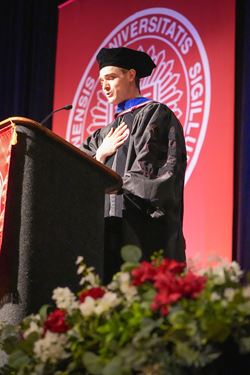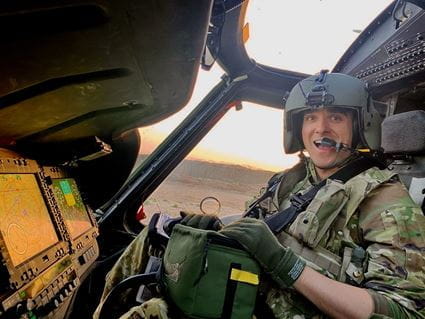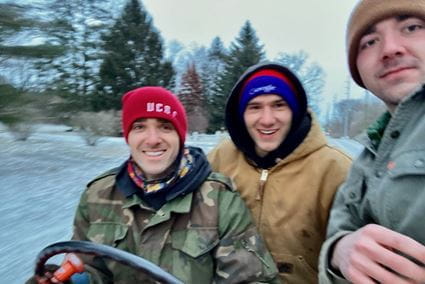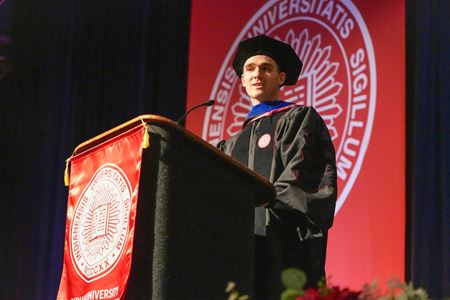If someone would’ve asked Oliver Strobel at the beginning of college what the function of the prostate gland is, he probably would’ve answered, “What’s the prostate?”
He loves science, but anatomy wasn’t his thing. Strobel has two brothers becoming doctors, but Oliver took a different path.
On May 16, Oliver and his brother Julian both graduated from the Indiana University School of Medicine — Julian with an MD and Oliver with a PhD in biochemistry and molecular biology. Their brother, Tristan, just finished his second year as an IU medical student.
“Oliver has always been one to take something apart and learn everything there is to know about a topic and then find ways to connect ideas or to make something new with the knowledge that he learned — be it when working on a car, projects at home, finances or science,” said Julian, who is on his way to becoming a family medicine physician. “The PhD definitely fits him.”
Today, Oliver knows quite a lot about the prostate. His research under mentors Travis Jerde, PhD, and Gustavo Arrizabalaga, PhD, focuses on understanding the inflammatory mechanisms leading to an enlarged prostate, a common condition in older men that can lead to urination issues.
It’s not so much the specific research field that matters to Oliver; it’s the process of discovery. Representing PhD graduates at the Class of 2025 commencement ceremony, Strobel spoke about the complimentary roles MDs and PhDs play as bench and bedside are “two different callings, one shared mission.”
“While our MD colleagues take their expertise to the patient’s bedside, our journey leads us to the frontiers of biomedical discovery — to decipher the mechanisms of complex disease, to pioneer novel therapies, to uncover the biological truths that drive medicine forward,” Strobel said. “But make no mistake — our paths do not split. Our research fuels the treatments they prescribe.”
Choosing a mentor
The Strobel family has roots in Germany, where Oliver was born. Although one of his research mentors shares this heritage — Jerde is active with the German American Club of Indianapolis — that wasn’t what drew Oliver to his lab. It was just a bonus.

Oliver took some good advice that he now passes on to students beginning a PhD journey: “Find a mentor you can get along with who’s going to challenge you. The project is going to change, and the people in the lab are going to change. But the mentor will train you.”
At the IU School of Medicine, most Indianapolis PhD students begin in the Indiana Biomedical Gateway Program, a first-year experience Oliver likens to speed dating. It involves choosing three, eight-week rotations with different labs, enabling both the student and potential mentors to feel out the fit.
“Dr. Jerde and Dr. Arrizabalaga are both charismatic and kind people who are good scientists,” Strobel said. “They’ve been fantastic mentors who gave me the intellectual freedom to ask questions, propose experiments and then execute those experiments. They both have a lot of patience.”
And really, that’s the crux of the scientific process. It requires patience and flexibility when results don’t match what’s hypothesized. As Oliver said in his graduation speech, PhDs learn to “fail forward, question assumptions, and keep going when nothing works.”
Jerde said he appreciates Oliver’s tech savvy, sense of humor and calm demeanor in the lab.
“Oliver is a careful scientist with a high level of rigor expectation,” Jerde added. “He is good at interpreting data and has a passion for developing new methodology.”
From lab to cockpit
 While Oliver peers into the microcosm of living organisms in the lab, he gains a macro perspective when he gazes upon Indiana cities from thousands of feet in the air as a helicopter pilot with the Indiana Army National Guard.
While Oliver peers into the microcosm of living organisms in the lab, he gains a macro perspective when he gazes upon Indiana cities from thousands of feet in the air as a helicopter pilot with the Indiana Army National Guard.
Both Oliver and Julian felt drawn to military service, following the example of their grandfathers who served in World War II. Julian joined the Army through the Health Professions Scholarship Program, which offers a full scholarship for medical school in exchange for a military commitment. Following his graduation from the IU School of Medicine, Julian will head to Texas to begin training as a family medicine resident at Darnall Army Medical Center at Fort Cavazos.
Oliver joined the National Guard after high school and was called to active duty in the Middle East right after committing to his research lab at IU. Jerde was impressed that Oliver tuned into lab meetings remotely and was an active participant in discussions.
Oliver draws some parallels between conducting science and military operations. Both require careful, evidence-based planning to define and drive the mission. Yet both will inevitably require course changes as obstacles arise and new information is revealed. In the lab, experiments can fail and data often doesn’t align.
“In that moment, just like in the cockpit, we do not panic — we adapt,” he said.
Navigating into the future
While the Strobel brothers have charted their own paths, they are grateful for their convergence at the IU School of Medicine over the past couple of years.
 “Sometimes, our schedules would overlap in a way that allowed me to walk up to Oliver’s lab and visit during lunch hour,” Julian said. “I was able to have interesting conversations with him and his friends about the research they were doing, and they were always curious to know how this might look on the clinical side of things.”
“Sometimes, our schedules would overlap in a way that allowed me to walk up to Oliver’s lab and visit during lunch hour,” Julian said. “I was able to have interesting conversations with him and his friends about the research they were doing, and they were always curious to know how this might look on the clinical side of things.”
Julian equally enjoyed sharing medical school experiences with his twin brother, Tristan. When they’re all together, the brothers talk about everything from military to medicine to mechanics.
Oliver runs a YouTube channel called Oli’s Garage, where he teaches people how to repair older Volkswagens. He’s also master of the Craftsman toolbox in the lab whenever equipment needs minor repairs. After graduation, Oliver plans to stay at IU as a postdoctoral researcher while continuing to serve with the National Guard, where he is an aviation company commander.
“His experience as a company commander brings him a level head in the lab,” Jerde noted. “He is calm under pressure. One time he helped a researcher who had an acid spill, and his collected demeanor helped the situation greatly.”
In his commencement remarks, Oliver told PhD graduates that the world needs their curiosity and resilience to navigate the unknown.
“Above all, our mission is about the courage to keep moving forward in pursuit of something greater than ourselves,” he said.
